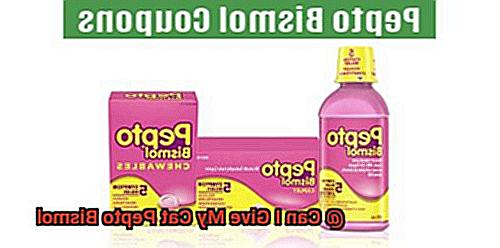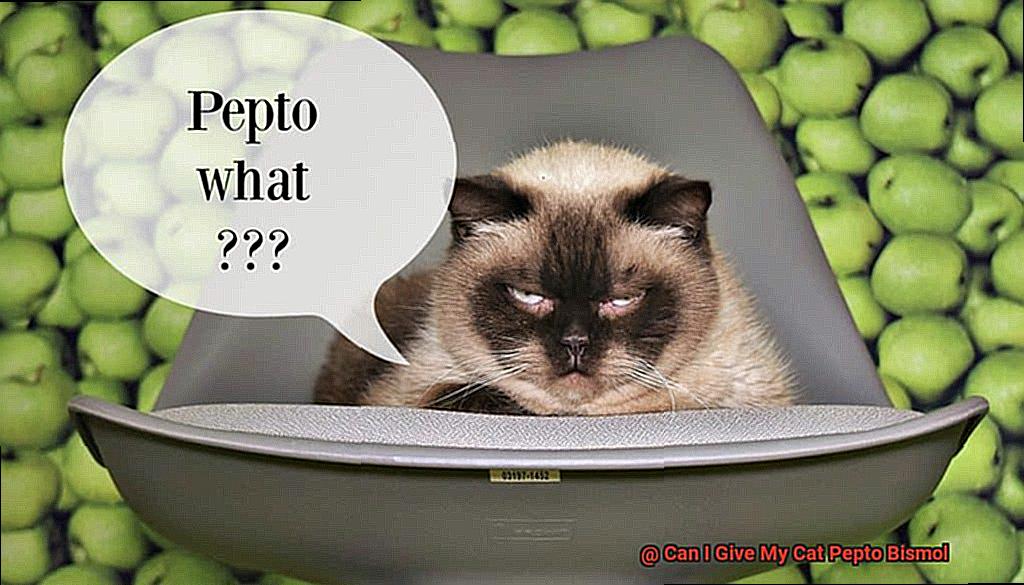Have you ever asked yourself, “Can I give my cat Pepto Bismol?” The answer is yes – but with caution.
Pepto Bismol can be helpful for cats in certain situations, but there are risks involved that pet owners should be aware of before administering the drug. Let’s start with the basics: what is Pepto Bismol?
It is an anti-antacid and anti-diarrheal medication containing bismuth subsalicylate as its active ingredient. For decades, it has been used to treat a variety of digestive disorders in humans, but is it safe for cats?
Yes – although with caution. Many veterinarians recommend Pepto Bismol in cats under certain circumstances; however, overdosing can result in severe side effects including vomiting, diarrhea, dehydration, and even liver damage.

So, if you’re planning to give your cat this medication, it’s important to follow your vet’s instructions closely and never exceed the recommended dosage. In addition to knowing the dangers involved with giving your cat Pepto Bismol, it’s also important to know when it can be helpful to them.
Now that we have a better idea of what Pepto Bismol is and when it can be used safely in cats, let’s explore how to administer this drug so that your feline friend gets the relief they need without any unwanted side effects.
How Can Pepto-Bismol be Harmful to Cats?

Pepto-Bismol is a medication commonly used to treat gastrointestinal problems in humans, but it can be highly dangerous for cats.
The active ingredient in Pepto-Bismol, aspirin, is toxic to cats and can cause serious health issues such as liver or kidney failure, gastrointestinal bleeding, and even death. Additionally, cats are unable to metabolize salicylates found in the medication, making it even more hazardous.
As such, it is strongly advised that pet owners seek veterinary consultation before administering any form of medication to their feline friend. The risks of giving Pepto-Bismol to cats far outweigh the potential benefits.
Therefore, when dealing with a cat’s digestive problems, seeking professional advice from a veterinarian is the safest course of action.
When Should You Seek Veterinary Advice?
When it comes to your feline friend’s health, it’s always better to be safe than sorry.
If your cat is exhibiting signs of gastrointestinal distress such as vomiting, diarrhea, or an upset stomach, you may be tempted to administer over-the-counter medications such as Pepto Bismol. However, this can be a risky move and may even result in serious health issues or death.
The best way to ensure your cat’s safety and wellbeing is to seek veterinary advice before administering any medication. Your veterinarian will be able to assess your cat’s overall health and recommend a treatment plan that is tailored specifically for their needs.
What are Some Safe and Effective Home Remedies for Upset Stomachs in Cats?
When your cat is suffering from an upset stomach, natural home remedies are an effective and safe way to provide relief.
It’s best to withhold food for 12-24 hours, while providing plenty of hydration with fresh water or low-sodium chicken broth. A bland diet of boiled chicken or plain boiled rice can also help soothe the stomach and aid digestion.
However, it’s important to keep an eye on your pet’s reaction before beginning any of these therapies.
What Other Medications Should be Avoided for Cats?
When it comes to caring for our feline friends, it’s essential to know which medications are safe and which should be avoided.
Acetaminophen (Tylenol), ibuprofen (Advil), aspirin, and naproxen can all be toxic or even fatal to cats, so these must be avoided at all costs. But it doesn’t stop there; you should never give your cat any medication without consulting with your veterinarian first.
Cats have a unique metabolism that can make certain medications less effective or more toxic than in humans or dogs. Always err on the side of caution when giving medications to cats.
They will provide you with guidance on the appropriate dosage and administration of any medication and can help you select safe and effective treatments for your cat’s health needs.
Is There an Alternative to Pepto-Bismol for Cats?
If your cat is suffering from an upset stomach, Pepto-Bismol may seem like the most convenient option.
However, it is important to remember that cats have a unique metabolism and this medication can be dangerous for them. So what are the alternatives?
Fortunately, there are some products that may be able to help relieve your cat’s upset stomach without causing any allergic reactions. For instance, you could give your cat a bland diet of boiled chicken or fish and rice which will help soothe their stomach.
Alternatively, you could also try giving them a probiotic supplement to restore the balance of beneficial bacteria in their gut. If you’re looking for something more natural, ginger or chamomile tea can help soothe an upset stomach.
Finally, if your cat is experiencing severe or persistent digestive issues, it’s best to take them to the vet for a proper diagnosis and treatment plan tailored to their individual needs.
How Can I Tell if My Cat Has an Upset Stomach?
It’s important to keep an eye out for signs of physical and behavioral changes that can indicate discomfort.
Your cat may also become lethargic or overly sleepy, or start whining more than usual.
What Are the Signs of Toxicity in Cats After Taking Pepto-Bismol?
Pepto-Bismol is an over-the-counter medication for humans that can sometimes be given to cats to treat digestive issues such as diarrhea, upset stomach, or vomiting.
However, it is important to note that not all medications that are safe for humans are also safe for cats. Pepto-Bismol contains salicylates, a type of aspirin which can be toxic to cats if given in excess.
If your cat has taken Pepto-Bismol, it is essential to be aware of the signs of toxicity in cats. Common symptoms include vomiting, diarrhea, loss of appetite, lethargy, weakness, jaundice, disorientation, and seizures.
If you observe any of these signs after giving your cat Pepto-Bismol, seek veterinary attention immediately. It is important to always consult your veterinarian before giving any medication to your cat.
Your vet will be able to advise you on a safe and appropriate dose based on your cat’s weight, age and underlying health conditions and may recommend alternative treatments that are better suited for your pet’s individual needs.
edl4UtLWEuY” >
How Can I Prevent Digestive Issues in My Cat?

It is essential to ensure that your feline friend has a healthy digestive system.
Digestive issues can lead to a lot of discomfort, and in severe cases, can even be fatal. Fortunately, there are several ways to prevent digestive issues in your cat.
Providing your pet with the right diet is key. Ensure that you feed them a nutritious and well-balanced diet – avoiding table scraps or foods that are not meant for felines – as this can cause digestive problems.
In addition, make sure they have plenty of fresh water at all times to prevent dehydration, which can also lead to digestive complications. Regular exercise is also necessary for your cat’s digestive health.
Physical activity helps improve digestion and prevents constipation; provide them with toys to play with, scratching posts, and other interactive play items for daily exercise. Good hygiene practices are also important in preventing digestive issues in cats.
Clean their litter box regularly to avoid bacterial infections that can cause digestive complications; groom them regularly as well to prevent hairballs from clogging their intestines and causing discomfort.
Also Read: Can Cats Eat Aloe Plant? – 21Cats.org
Conclusion
In conclusion, it is possible to give cats Pepto Bismol under certain conditions.
However, administering the drug requires caution and a full understanding of the risks involved. Before giving your cat any medications, it’s best to talk to a veterinarian who can evaluate your pet’s overall health and recommend a safe dosage and treatment regiment specifically for their needs.
There are also natural home remedies that can be used to treat a bloated stomach in cats, such as withholding food for 12-24 hours, providing hydration with fresh water or low-sodium chicken broth, and feeding them a bland diet of boiled chicken or plain boiled rice.
It’s important to note that some medications should be avoided for cats; acetaminophen, ibuprofen, aspirin, and naproxen are all toxic or fatal for felines.
Finally, regular exercise and good hygiene habits are key for preventing digestive problems in cats.







